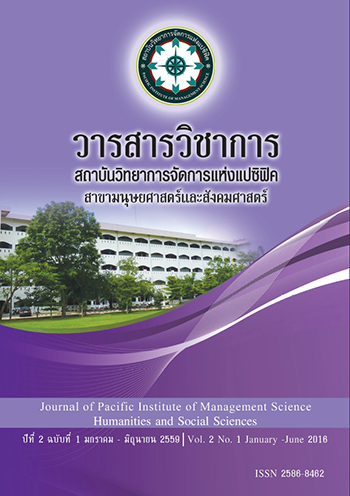The Study on Ethical Principles of School Administrators as Perceived by Teachers Level Individuals schoolmasters in Takpha Taklee school. Province under Office of Secondary Educational Service Region 42. Nakhon Sawan
Keywords:
ethical principles of school administratorsAbstract
This study aimed to study and compare ethical principles of school administrators according to teachers’ opinions in Takpha Taklee school Province under the Office of Secondary Educational Service Region 42.
The study has been concerned professional ethics of school administrators as classified by gender and official working experience. The sample of this study consisted of 175 school teachers in secondary schools in Takpha Taklee school Province under the Office of Secondary Educational Service Region 42 Nakhon Sawan. The research tool in this study was a 50 – item rating scale questionnaire. The reliability coefficient of the questionnaire was 0.85. The statistical analysis of data employed percentage, mean, standard deviation and t-test.
The results of the study were as follows:
The teachers’ opinions towards code of conduct of the administrators as a whole was at highest level ( x̄ = 4.52). When considering in each aspect it was found that the highest mean recipient ethics ( x̄ = 4.54). The second was collaborator ethics ( x̄ = 4.53). The third was own self ethics and social ethics ( x̄ = 4.52). The least mean score was one’s recipient ethics own self ethics ( x̄ = 4.49).
The comparison of teachers’ opinions in Takhli District found that there was no statistical significant difference in all aspects according to gender and official working experience.
References
เครือวัลย์ ลิมปิยะศรีสกุล. (2543). มนุษย์สัมพันธ์ในการทำงานของบุคลากรในการบริหารงานบุคคล. กรุงเทพฯ : สถาบันพัฒนาข้าราชการพลเรือน.
จิราภรณ์ ทองศรี, และคณะ. (2553). คุณธรรมของผู้บริหารสถานศึกษาตามความคิดเห็นของผู้บริหารสถานศึกษา ครูผู้สอน และคณะกรรมการการศึกษาขั้นพื้นฐานสังกัดสำนักงานเขตพื้นที่การศึกษาสิงห์บุรี. วิทยานิพนธ์คุรุศาสตร์มหาบัณฑิต. มหาวิทยาลัยราชภัฏเทพสตรี, ลพบุรี.
ตินปรัชญพฤทธิ. (2542). ข้อมูลเกี่ยวกับพันธะทางสังคม ความรู้รับผิดชอบต่อสังคม วิชาชีพนิยมและจรรยาบรรณในการปฏิบัติงาน. กรุงเทพฯ : ศูนย์ส่งเสริมจริยธรรม สำนักงานคณะกรรมการข้าราชการพลเรือน.
ธนสาร บัลลังก์ , และ ปัทมา เบญจภาคี. (2552). คุณสมบัติของคนที่จะเป็นผู้บริหาร. สืบค้นเมื่อวันที่ 7 กันยายน 2558, จาก http://www.gotoknow.org/posts/359783
ธีระ รุญเจริญ. (2545). ผู้บริหารสถานศึกษามืออาชีพ. นครราชสีมา : สหมิตรพรินส์ติ้ง.
บุญชม ศรีสะอาด. (2545). วิธีการสร้างสถิติสำหรับการวิจัย.(พิมพ์ครั้งที่ 6). กรุงเทพฯ : สุวีริยาสาส์น.
บุญร่วม คิดการ. (2545). การปฏิบัติตามคุณธรรมของผู้บริหารโรงเรียนประถมศึกษา สังกัดสำนักงานการประถมศึกษา จังหวัดนครพนม. วิทยานิพันธ์การศึกษามหาบัณฑิต. มหาวิทยาลัยมหาสารคาม, มหาสารคาม .
บุรัญชัย จลกลณี. (ม.ป.ป.) คุณธรรมและจรยธรรมของผู้บริหาร. กรุงเทพฯ : คณะพาณิชยศาสตร์ และการบัญชี มหาวิทยาลัยธรรมศาสตร์ .
Downloads
Published
Issue
Section
License
บทความที่ได้รับการตีพิมพ์เป็นลิขสิทธิ์ของ สถาบันวิทยาการจัดการแห่งแปซิฟิค
ข้อความที่ปรากฏในบทความแต่ละเรื่องในวารสารวิชาการเล่มนี้เป็นความคิดเห็นส่วนตัวของผู้เขียนแต่ละท่านไม่เกี่ยวข้องกับสถาบันวิทยาการจัดการแห่งแปซิฟิค และคณาจารย์ท่านอื่นๆในสถาบันฯ แต่อย่างใด ความรับผิดชอบองค์ประกอบทั้งหมดของบทความแต่ละเรื่องเป็นของผู้เขียนแต่ละท่าน หากมีความผิดพลาดใดๆ ผู้เขียนแต่ละท่านจะรับผิดชอบบทความของตนเองแต่ผู้เดียว







